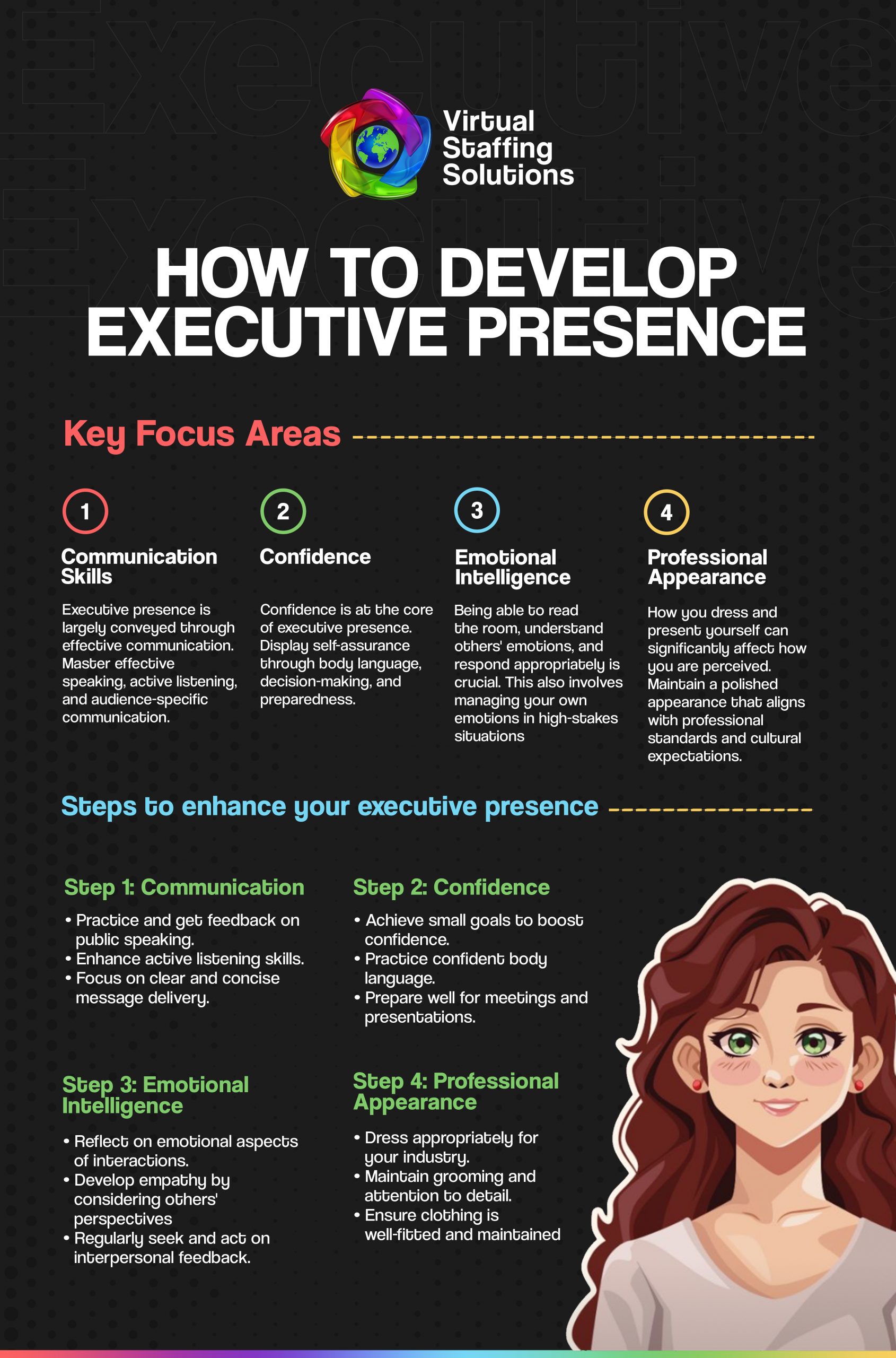🔍 How to Develop Executive Presence: A Detailed Guide to Elevating Your Leadership Impact 🌟
Sent by the Learning & Development Team
Hello Team Leaders,
Executive presence is the “it” factor that helps you command respect, build trust, and lead effectively. It combines the right mix of communication, confidence, emotional intelligence, and professional appearance. Enhancing your executive presence can significantly affect how you influence and inspire others. Let’s dive deeper into each key focus area and explore practical steps to develop a powerful executive presence.
Key Focus Areas for Developing Executive Presence
1. Communication Skills:
- Why it matters: Communication is the cornerstone of executive presence. How you speak, listen, and engage in conversations determines how others perceive your leadership abilities.
- Steps to Mastery:
- Practice Public Speaking: Join clubs like Toastmasters or volunteer for presentations to practice speaking in front of groups. Focus on clarity, volume, and pacing.
- Enhance Active Listening Skills: Practice reflective listening by summarizing what others have said before responding. This shows attentiveness and ensures understanding.
- Tailor Your Message to Your Audience: Adapt your communication style to suit the audience—senior leaders, peers, or team members. Use storytelling to make your points relatable and memorable.
- Refine Non-Verbal Communication: Pay attention to your tone, body language, and facial expressions. Open body language, steady eye contact, and nodding affirmatively can reinforce your spoken words.
2. Confidence:
- Why it matters: Confidence exudes authority and helps you make an impression. Confident leaders are more persuasive and are often trusted to make tough decisions.
- Steps to Mastery:
- Achieve Small Wins Regularly: Break down large goals into smaller, manageable tasks and celebrate when you achieve them. These small wins build momentum and confidence.
- Develop Strong Body Language: Stand tall, maintain an open posture, and use deliberate hand gestures to emphasize key points. Avoid crossing your arms or fidgeting.
- Prepare Thoroughly: Confidence often comes from being well-prepared. Know your content, anticipate questions, and have data to back up your points. Rehearsing answers to potential questions can help you remain composed.
- Use Positive Affirmations: Practice self-talk that reinforces your abilities and expertise. Phrases like “I am capable of handling this situation” can boost confidence.
3. Emotional Intelligence:
- Why it matters: Emotional intelligence (EQ) is the ability to recognize, understand, and manage your own emotions and those of others. High EQ leaders can navigate complex interpersonal dynamics and build strong relationships.
- Steps to Mastery:
- Practice Empathy: Place yourself in others’ shoes and consider their perspectives before reacting. This practice builds rapport and trust.
- Manage Your Reactions: Learn to stay calm under pressure. Techniques like deep breathing, counting to ten, or stepping away briefly can help manage emotions in high-stress situations.
- Develop Self-Awareness: Regularly reflect on your behavior and its impact on others. Journaling or receiving feedback can help you understand your emotional triggers.
- Resolve Conflicts Effectively: Approach conflicts with an open mind and a problem-solving attitude. Listen to all parties involved and focus on finding common ground.
4. Professional Appearance:
- Why it matters: Your appearance is the first impression you make. A polished, professional appearance can significantly influence how others perceive your competence and credibility.
- Steps to Mastery:
- Dress for Success: Understand the dress code in your industry and always aim to be slightly more polished than expected. Choose well-tailored, clean, and well-maintained clothing that suits your role.
- Maintain Grooming Standards: Pay attention to personal grooming—clean hair, well-trimmed nails, and appropriate makeup or accessories can enhance your professional look.
- Consider Cultural Expectations: Be aware of and respect the cultural norms of your workplace, especially in a global environment.
- Mind the Details: Ensure your clothing is free from wrinkles, stains, or loose threads. Accessories should be minimal and professional.
Weekly Leadership Challenge
🌟 Strengthen Your Executive Presence:
- Select One Area to Focus On: Determine which of the four areas—Communication, Confidence, Emotional Intelligence, or Professional Appearance—you want to concentrate on this week.
- Develop a SMART Action Plan: Create specific, measurable, achievable, relevant, and time-bound actions for improvement in your chosen area.
- Seek Feedback and Reflect: After practicing, gather feedback from peers or mentors and reflect on your progress. Adjust your approach as needed for continued growth.
Executive presence is not something you are born with; it’s a skill that can be developed with intention and practice. Focusing on these core areas and implementing the detailed steps can enhance your influence, inspire trust, and lead with greater impact. Let’s work together to cultivate strong leaders who drive positive change! 🌟👔
